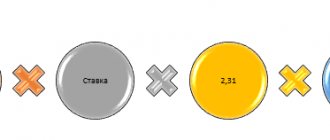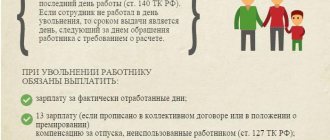Kontur.Accounting - 14 days free!
Personnel records and employee reports, salaries, benefits, travel allowances and deductions in a convenient accounting web service
Try it
Direct personal income tax (NDFL) is paid on employee salaries. Employers become tax agents and withhold income taxes from wages, directing the money to the federal budget. We will tell you about the rules for calculating and transferring tax, benefits and tax deductions.
On what income is tax paid?
Tax is paid not only on wages. The tax base includes all incentives, bonuses and other additional payments, including material benefits and income that the employee received in kind. The tax is calculated as follows:
- sum up all employee income;
- deduct official expenses from this amount;
- We charge a tax of 13, 15 or 30% on the received balance.
Certain types of income, which are listed in Art. 217 Tax Code of the Russian Federation. These are state benefits (except for unemployment benefits), pensions, donor rewards, alimony received, lump-sum assistance amounts and other payments. Since 2022, this list has been supplemented with compensation; compensation for travel on vacation and back has been separately allocated for workers from the Far North and equivalent areas.
Pay taxes and contributions in a few clicks in the Kontur.Accounting service! Get free access for 14 days
Compensation payments and financial assistance
With the help of compensation payments, part of your salary can be legally exempted from insurance premiums. For example, this applies to reimbursing employees for interest on their mortgage. Insurance premiums are not paid on these amounts, personal income tax is not charged on amounts not exceeding the limit of 3% of the payroll.
Some compensations are completely exempt from insurance premiums and personal income tax. This includes any of the following payments:
- travel expenses to and from your destination,
- airport service fees, commission fees,
- expenses for travel to the airport or train station at places of departure, destination or transfers,
- baggage costs (related to work trips),
- living expenses,
- expenses for payment of communication services and others.
As for financial assistance, it should be remembered that insurance premiums are not charged for payments to employees in connection with marriages, funerals of close relatives, as well as for treatment of employees and their family members (this is indicated by the resolution of the Arbitration Court of the Moscow District No. F05-26116/ 2019 dated February 20, 2020).
Advantages of the method: There are quite a few options for compensation provided to employees under the Labor Code of the Russian Federation; if desired, each company will be able to replace part of the employee’s salary with the corresponding payment. At the same time, they will be exempt from personal income tax and insurance premiums in whole or in part.
Disadvantages of this method: Optimization has a temporary effect and cannot be done regularly. For companies with a large staff, the amount of savings may be insignificant in monetary terms. This method of reducing insurance premiums requires additional documentation. Not all compensation payments and financial assistance can be taken into account when calculating the simplified tax system or income tax.
Income Tax Percentage Rate in 2022
The tax rate depends on the status of the taxpayer: whether the employee is a resident or not. A resident is someone who has been legally in Russia for more than 183 days and does not leave its borders during this period. In 2022, a special rule was in force - those who spent from 90 to 182 days in Russia received resident status. Otherwise, the taxpayer is recognized as a non-resident. Be careful: your employee's status may change throughout the year.
The standard tax rate for residents is 13%, for non-residents - 30%.
Additionally, tax rates vary depending on the type of income received. Thus, salaries are taxed at a rate of 13%, and income from savings on interest or winning a competition (for a prize amount over 4,000 rubles) is taxed at a rate of 35%.
Also, from January 1, 2022, a new personal income tax rate appeared - 15%. It is taxed on the income of residents and non-residents that exceeded 5 million rubles. That is, part of the income within 5 million rubles is taxed at a rate of 13% (650,000 rubles), and then at a rate of 15%.
The increased rate does not apply to the income of residents:
- from the sale of any personal property (except securities);
- in the form of the value of property (except for securities) received as a gift;
- in the form of insurance payments under insurance and pension contracts.
Deadlines for paying contributions for employees in 2020
The majority of insurance premiums from 2022 are administered by the Federal Tax Service. Only deductions for injuries remained under the jurisdiction of the Social Insurance Fund. The general deadline for payment of these payments is no later than the 15th day of the month following the reporting month.
| Type of insurance premium | Reporting period | Payment deadline |
| Contributions to compulsory social insurance for employees in the Federal Tax Service (except for injuries) | December 2019 | 15.01.2020 |
| January 2020 | 17.02.2020 | |
| February 2020 | 16.03.2020 | |
| March 2020 | 15.04.2020 | |
| April 2020 | 15.05.2020 | |
| May 2020 | 15.06.2020 | |
| June 2020 | 15.07.2020 | |
| July 2020 | 17.08.2020 | |
| August 2020 | 15.09.2020 | |
| September 2020 | 15.10.2020 | |
| October 2020 | 16.11.2020 | |
| November 2020 | 15.12.2020 | |
| Contributions for injuries to the Social Insurance Fund | December 2019 | 15.01.2020 |
| January 2020 | 17.02.2020 | |
| February 2020 | 16.03.2020 | |
| March 2020 | 15.04.2020 | |
| April 2020 | 15.05.2020 | |
| May 2020 | 15.06.2020 | |
| June 2020 | 15.07.2020 | |
| July 2020 | 17.08.2020 | |
| August 2020 | 15.09.2020 | |
| September 2020 | 15.10.2020 | |
| October 2020 | 16.11.2020 | |
| November 2020 | 15.12.2020 |
If you miss the deadline for paying insurance premiums, you may be held liable in the form of a fine. In addition, for each day of delay, penalties will be charged on the amount owed. We talk about this in more detail in this article.
Tax deductions
Before calculating the tax, you need to subtract tax deductions from the amount of income - benefits that are provided to employees. Deductions are due to employees who bought an apartment, spent money on training or treatment, as well as citizens with children and combatants. Among the most popular deductions:
- 1,400 rubles - standard tax deduction for the first and second child and 3,000 rubles for the third and each subsequent child (read more about deductions for children here);
- 500 rubles is a standard deduction for heroes of the USSR and the Russian Federation, participants of the Second World War, blockade survivors, disabled people since childhood and disabled people of groups 1 and 2, as well as some other categories of citizens (if an employee has the right to several standard deductions, he can use only one, sum up Only deductions for children are possible);
- A property deduction for a home buyer in the Russian Federation is provided on the basis of an application, a tax return and documents that confirm the purchase or payment of interest on the mortgage. It can be obtained once in a lifetime, and the amount is limited to actual costs or 2 million rubles for a one-time purchase/construction of property and 3 million rubles for a mortgage (for more details, see Article 220 of the Tax Code of the Russian Federation);
- social deduction for expenses on education or treatment of an adult or child, as well as for some other expenses, is provided on the basis of an application and documents confirming expenses (for more details, see Article 219 of the Tax Code of the Russian Federation);
- Professional tax deductions are received by entrepreneurs, lawyers, and notaries when confirming expenses in their business or advocacy activities (for more details, see Article 221 of the Tax Code of the Russian Federation).
Example. The employee's salary is 50,000 rubles. He is the father of three minor children. For the first two, the deduction will be 1400 + 1400 = 2800 rubles, for the third another 3000 rubles, for a total of 5800 rubles.
The base for calculating the tax will be: 50,000 - 5,800 = 44,200 rubles. Personal income tax must be calculated from this amount and transferred to the budget.
Free food for employees under clause 1 of Art. 255 of the Tax Code of the Russian Federation - are these taxable expenses?
Next example.
Lira LLC organized free meals for its employees. The organization does not have a specialized canteen, but all the necessary conditions have been created in the room for meals, and food is also purchased, from which lunches are prepared by a specially hired employee. Can such expenses be included in the item “Payment”?
In order to include such expenses in the “Payment” item, you need to reflect the conditions for providing free food in employment contracts with employees. After all, in accordance with Art. 131 of the Labor Code of the Russian Federation, you have every right to partially pay wages in kind. Free meals for employees in this case will be qualified as payment of wages in kind.
In this case, the salary will consist of the accrued salary (piece rate) and the cost of organized free meals. The basis for attributing the costs of free food to wages in such a situation will be clause 1 of Art. 255 of the Tax Code of the Russian Federation, according to which such costs can include amounts accepted from the employer in accordance with various types of settlements with employees. However, according to the Ministry of Finance of the Russian Federation, it is possible to take into account the cost of free food in labor costs only on the condition that the organization keeps records of the income received by each employee, and personal income tax is withheld from the employee from the cost of food (letter of the Ministry of Finance of Russia dated January 09, 2017 No. 03 -03-06/1/80065, dated 02/11/2014 No. 03-04-05/5487).
Calculation and withholding of income tax from salaries
The employer’s responsibility is to calculate, withhold and pay tax to the budget. The procedure is prescribed in Art. 226 Tax Code of the Russian Federation.
Tax is calculated on a monthly basis, with the offset of previously withheld amounts. The last day of the month is considered the day you receive your salary (it doesn’t matter whether it’s a working day, a weekend or a holiday). In the usual and simplest case, personal income tax is withheld once a month when calculating wages on the last day of the month. The employer withholds the calculated tax, only after that other deductions are deducted from the salary - alimony, loan repayment, etc.
If the amount of deductions exceeds the tax base in this month, then, according to calculations on an accrual basis from the beginning of the year, personal income tax in the month may be zero or negative. Then the overly withheld tax can be offset in the next month or returned to the employee upon his application. Transferring standard and social deductions from one month to another is possible only within a calendar year. But the excess property deductions are transferred to the new year, and then the employee must write a new notice of the right to deduction.
Tax transfer
Pay taxes and contributions in a few clicks in the Kontur.Accounting service! Get free access for 14 days
Income tax is transferred to the budget within the following periods:
- if the organization pays wages in cash, we transfer the tax on the day the money is received from the bank;
- if the organization pays salaries non-cash, we transfer the tax on the day the funds are transferred to the employees’ cards;
- if the organization pays salaries from other sources (for example, from revenue without withdrawing money from a bank account) - we transfer the tax the next day after the income is issued;
- if an organization transfers material benefits and income in kind, we transfer the tax the next day after it is withheld.
Sometimes income taxes are paid in multiple payments within a month due to different types of payments. Withheld income tax is transferred according to the details of the tax service where the organization is registered. Separate divisions transfer personal income tax according to the details of the tax office in which they are registered.
Citizens who pay personal income tax on their own based on the 3-NDFL declaration transfer the tax no later than July 15 of the year following the expired tax period.
Money as a gift
You can now receive money as a gift without paying taxes not only from close relatives, but also from people of varying degrees of acquaintance. But be careful if you are an official: a gift may be considered a bribe.
You can also accept gifts in kind, if it is not an apartment, a car, shares or shares. If any of the above is not given to you by a close relative, you will have to pay personal income tax.
A money transfer to a card, if it is a gift, is also not subject to tax.
Fines for personal income tax violations
The employer’s actions must comply with the requirements of the law and fit within the stated time frame, otherwise fines and penalties cannot be avoided:
- if the employer did not withhold or transfer income tax without legal grounds, he will face a fine of 20% of the amount of the untransferred tax;
- in case of evasion of personal income tax on a large scale, the violator may face a fine of 100-300 thousand rubles or a fine in the amount of salary for 1-2 years, deprivation of the right to hold certain positions for 3 years and even arrest for 6 months or imprisonment for up to 2 years.
Calculate personal income tax automatically and transfer tax using the Kontur.Accounting web service. Here you can easily keep records, calculate salaries, generate and send reports, and also benefit from the support of our experts. The first month of using the service is free.
Try for free




